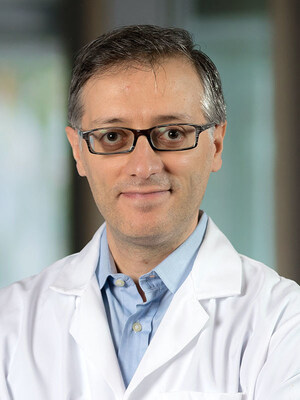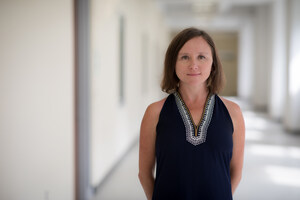Renowned Stem Cell Researcher Shinya Yamanaka Delivers the 2011 Lasker Lecture at Einstein
BRONX, N.Y., Oct. 24, 2011 /PRNewswire-USNewswire/ -- Shinya Yamanaka, M.D., Ph.D., the internationally renowned scientist known for his pioneering work generating the first induced pluripotent stem cells (iPS cells), delivered the 2011 Lasker Lecture at Albert Einstein College of Medicine of Yeshiva University today. A standing-room-only crowd was on-hand for his presentation covering his initial groundbreaking research with iPS cells and his ongoing research in the field.
The Lasker Lecture features a presentation by a Lasker Award recipient that explores fundamental scientific questions and elucidates topics of pressing interest in medical research practice. Dr. Yamanaka, director of the Center for iPS Cell Research and Application and professor at the Institute for Frontier Medical Sciences at Kyoto University, Japan, is a 2009 Lasker laureate, along with John Gurdon of the University of Cambridge, England, for their discoveries concerning reprogramming the nuclei of cells. Dr. Yamanaka is recognized for being the first to reprogram adult cells to behave as pluripotent stem cells, an advance he accomplished in mice and then with human skin-derived fibroblasts.
Allen M. Spiegel, M.D., the Marilyn and Stanley M. Katz Dean of Einstein, welcomed the capacity crowd in Einstein's Ethel and Samuel J. LeFrak Auditorium. "We are happy to host this unique lecture and to welcome Dr. Yamanaka to Einstein," said Dr. Spiegel. "This is also a terrific opportunity for faculty, students and postdocs to hear from one of the leading stem cell researchers in the field."
Dr. Spiegel introduced Maria Freire, Ph.D., president of The Albert and Mary Lasker Foundation, which administers the Lasker Award. Dr. Freire offered remarks about the foundation and its mission to encourage public support of biomedical research. Noting his remarkable career, Dr. Spiegel introduced Dr. Yamanaka and remarked on the breadth of his experience and training – from his initial medical training in orthopedic surgery to his breakthrough discoveries in iPS cells.
In delivering his keynote presentation, titled "Induction of Pluripotency by Defined Factors," Dr. Yamanaka drew admiration and laughs. The talk, punctuated by numerous humorous asides, detailed his scientific career, especially his postdoctoral years at the Gladstone Institute of Cardiovascular Diseases at the University of California, San Francisco (UCSF) and his current work at Kyoto University.
Dr. Yamanaka first worked with embryonic stems cells at UCSF in order to develop transgenic mice, and set his sights on generating human iPS cells after securing his own lab at the Nara Institute of Science and Technology in Japan. His lecture highlighted the importance of combining vision and hard work, and the factors – both personal and professional – that led to his revolutionary achievements.
Dr. Yamanaka also discussed potentially important benefits offered by iPS cells, including possible therapies for ALS, often called Lou Gehrig's disease, which is caused by defective motor neurons and for which there is no effective treatment. Skin cells from patients are transformed into iPS cells and are then differentiated into motor neuron cells. "These motor neurons have the same genetic information, so many scientists are now using them to understand disease mechanisms and perform drug screens," he said.
Paul Frenette, M.D., director of Einstein's Ruth L. and David S. Gottesman Institute for Stem Cell and Regenerative Medicine Research, followed with his presentation "Neural Control of Stem Cell and Cancer Microenvironments." In previous research, Dr. Frenette found that signals from the autonomic nervous system, direct hematopoietic (blood-forming) stem cells to migrate from the bone marrow and enter the bloodstream, where they differentiate into whatever blood cells the body needs. His current work on prostate cancer points to a similar role for nerves in cancer progression.
The Lasker Awards are given to those who have made major contributions to medical science. They are sometimes referred to as "America's Nobels" because 81 Lasker laureates have received the Nobel Prize, including 29 in the last two decades.
SOURCE Albert Einstein College of Medicine
WANT YOUR COMPANY'S NEWS FEATURED ON PRNEWSWIRE.COM?
Newsrooms &
Influencers
Digital Media
Outlets
Journalists
Opted In





Share this article